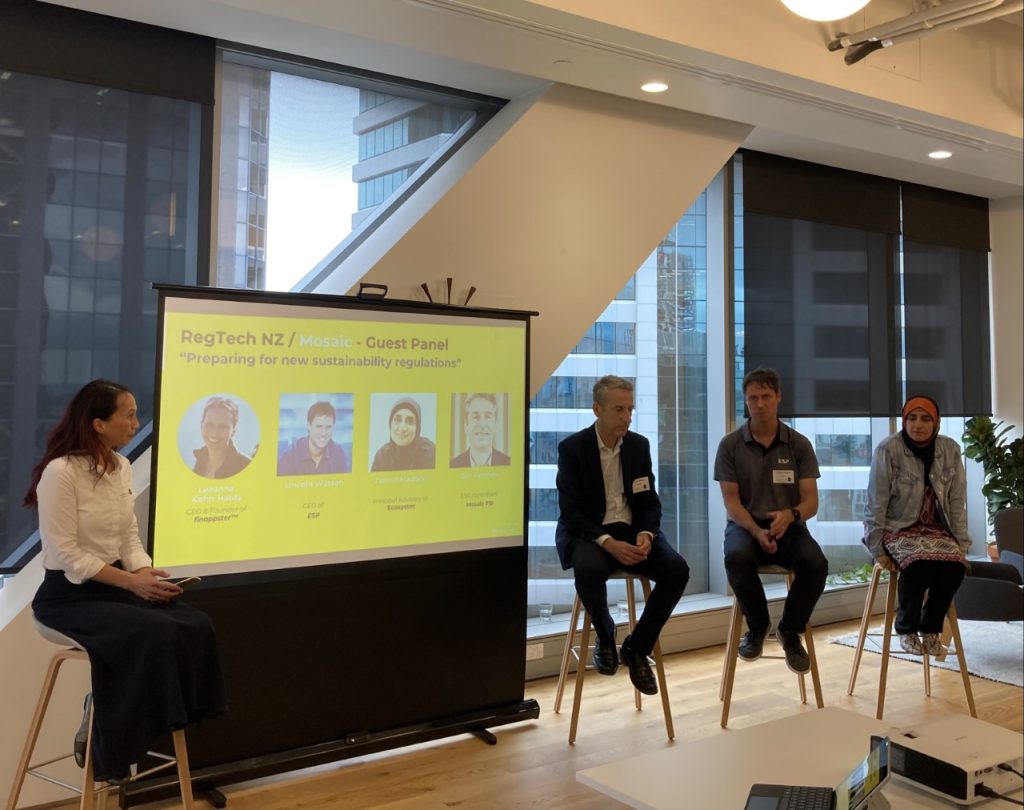It was an exciting evening not because the RegTech NZ and Sustainable Finance working groups were having their first collab. It wasn’t even because both groups were celebrating their first birthday. It was because this was the first in-person event held by either working group.
Thanks to our sponsors Mosaic FSI, our MC Leeanna Kohn-Hardy, and our panellists Jon Kershaw, Lincoln Watson and Jannat Maqbool started the discussion by identifying the various legislation and regulations that had come into force or is about to come into force. From an Environmental perspective, the discussion centred on Climate Disclosures. From a Social perspective on Modern Slavery and a Governance perspective on Consumer Data Rights, to name a few. Panellists also considered regulations that crossed E, S and G boundaries, such as the Emissions Reduction Plan, which includes reforms to the education and training system and the provision of retraining and skills enhancement to support employees’ transition to a lower carbon economy.
With this and a slew of other legislation and regulation coming, panellists aired their concerns about the intensive requirements to implement and report, impacting not just the reporting companies but also their suppliers.
Given 97% of New Zealand’s economy comprises small businesses (less than 20 people)[1], the potential detrimental effect could be significant.
“Emissions management is going to go nuts… spreadsheets won’t cut it.”
Everyone in the room acknowledged that tech was a key enabler for helping businesses become more sustainable. A finding in ANZ Thinkstep’s recent report supported this – that digital technology, as an enabler of a variety of actions, could collectively reduce 7.2 million tonnes of C02e, across transport, energy and industry and agriculture, by 2030. That’s about 42% of our emissions budget target.[2]
Other benefits of using tech are a no-brainer in measuring, monitoring and reporting emissions. Front and centre are scope three emissions, in particular financed emissions. An example of aggregation as a benefit is a Software as a Service tool like finappster™, which solves the current challenge regarding the lack of transparency in using investments to combat climate change and improve corporate sustainability practices. Scalability is another benefit, as well as improved accuracy and increased availability of more or even real-time reporting, such as the service provided by Ecosystm360.
“Data helps to measure and optimise what we’re doing, but we need to make some big cultural and product leaps to meet our targets.”
While we need to be upbeat about the steps businesses in New Zealand have taken, we need to do more. Once measuring and monitoring have started, a lot of learning takes place. The panel encouraged people to get started as supporting processes to direct the change that needs to be implemented. Regulation is coming soon, but more importantly, it takes time to measure, report and improve. In the environmental space, carbon-accounting software is the first step.
We have seen the availability of intelligent carbon management tools, such as ESP’s innovative CarbonHub, which enables businesses to efficiently calculate their carbon footprint, set targets and report progress with easy-to-use software. But technology to help reduce our emissions is moving ahead, and businesses need to engage to comply with regulations and make the required changes to achieve their goals.
Given the slew of E, S and G regulations, the panellists discussed challenges with the number of individual solutions, which combined would result in costly compliance for businesses and the potential development of an ecosystem.
In addition, panellists agreed that tech was not the ‘magic bullet’ and that businesses needed to consider implementing policies and processes to support that tech and their strategic direction. New Zealand has already seen solutions in play, like Mosaic FSI, who have implemented pragmatic solutions to support GDPR regulations and are well-placed to support businesses through the impending Consumer Data Rights legislation.
“We need to bring ourselves and our people on the journey – regulation will drive the change.”
[1] Ministry of Business, Innovation and Employment, Small Business, 25/7/22
[2] ANZ Thinkstep, Digital Technologies and Climate Change, 23/11/22







